|
|
|
Sort Order |
|
|
|
Items / Page
|
|
|
|
|
|
|
| Srl | Item |
| 1 |
ID:
125031


|
|
|
|
|
| Publication |
2013.
|
| Summary/Abstract |
This paper locates the discussion on wearing niqab and burqa within the context of information acquisition and response formation among Muslims and non-Muslims in the contemporary world. The paper argues that, against the backdrop of varied opinions on Islam and Muslims around the world, the debate on wearing burqa represents the continuation - albeit up-scaling - of the focus on Muslim women as the signifiers of Islam and Muslim identities. Australia is influenced by, and dealing with, the debate on whether or not to ban the burqa and niqab. Opinions among both the wider community and Muslims have differed on the justification and advisability of such a ban. The Australian government at the federal and state levels has demonstrated cautious activism in dealing with the issue, thus protecting the rights of Australian Muslim minorities, and reducing the space in which a heightened sense of exclusion could develop among them.
|
|
|
|
|
|
|
|
|
|
|
|
|
|
|
|
| 2 |
ID:
139127


|
|
|
|
|
| Summary/Abstract |
The Bedoun (stateless/without nationality) in Kuwait constitute a controversial concurrent social, political and legal issue, which was and still is the subject of heated political debate, a vivid example of social conflict, and a platform of extensive legal deliberation concerning its thorny dimensions. The problem of Bedoun is not only politically and socially complex, but it has its problematic legal dimensions, which have made it, since the 1950s, a complex and chronic problem. The recent growing interest in addressing the issue and the extensive strife to determine its degree of complexity and entanglement could be ascribed to the margin of freedom enjoyed in Kuwait more than the rest of the Arabian Gulf states, since active social and political participation constitute the pillars of the democratic system in Kuwait, in light of the growing political and media freedoms and the focus on the Bedoun as a marginalized community legally, politically and socially. Therefore, the current problem ofBedoun constitutes the strongest internal concern for the Kuwaiti authorities and people after the external threats, especially because it has always been ignored or treated as a security issue at times. This study seeks to shed light on the issue of Bedoun to decipher its causes and its historical development until it became a pressing issue at government and community levels in the State of Kuwait. The study will avoid the complex legal and social complexities of the issue.
|
|
|
|
|
|
|
|
|
|
|
|
|
|
|
|
| 3 |
ID:
129205
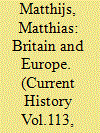

|
|
|
|
|
| Publication |
2014.
|
| Summary/Abstract |
After a tumultuous professional marriage of just over 40 years, Britain and Europe are facing the possibility of divorce. In January 2013, Prime Minister David Cameron decided to celebrate Britain's 40th anniversary as a member of the European Union by pledging a fundamental renegotiation of his country's terms of membership. Cameron further promised to submit any renegotiated deal to a clear "in-or-out" referendum in 2017 on whether or not to leave the EU, assuming his own Conservative Party wins a majority in the next general election in May 2015. Egged on by his party's growing ranks of restive Euroskeptics and trying to fight off a challenge on his right flank from populist Nigel Farage's UK Independence Party (UKIP), Cameron rolled the dice. He hoped to settle once and for all the Europe question, which has so often cast a dark shadow over the political debate in Westminster and Whitehall. Renegotiating
|
|
|
|
|
|
|
|
|
|
|
|
|
|
|
|
| 4 |
ID:
125040


|
|
|
|
|
| Publication |
2013.
|
| Summary/Abstract |
Despite its relative absence from much of the literature on politics in the Pacific region, religiosity is an assumed and often unchallenged component of political life. Drawing from more than 100 in-depth biographical interviews with politicians, around 40 published life histories and other publicly available material, this article uses Pierre Bourdieu's concept of 'habitus' to explore how politicians see the role of faith and religious association contributing to their public profile, election campaigning, representative and legislative functions, and 'inner' life. It advances two arguments: firstly, that ideal analytic distinctions like state, society and religion become problematic in the Pacific Islands where political leaders tend to occupy multiple roles and assume overlapping identities; and, secondly, that despite the overwhelming religiosity seemingly apparent in public rhetoric, secularization is an effervescent narrative across the region with politicians vocal protagonists on all sides of this debate.
|
|
|
|
|
|
|
|
|
|
|
|
|
|
|
|
| 5 |
ID:
133200


|
|
|
|
|
| Publication |
2014.
|
| Summary/Abstract |
The death wish of the Pakistani people is to strong that whenever anyone predicts a break up of their state, they welcome such tidings as a tribute to their uncanny ability to read the future.
|
|
|
|
|
|
|
|
|
|
|
|
|
|
|
|
| 6 |
ID:
130989
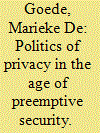

|
|
|
|
|
| Publication |
2014.
|
| Summary/Abstract |
In August 2013, a report was leaked to the Washington Post in which it was revealed that the US National Security Agency (NSA) violated its own privacy rules 2,776 times over a one-year period (Gellman 2013). The privacy violations documented in the report range from technical errors to serious violations such as operations without consent from the Foreign Intelligence and Surveillance (FISA) court and breach of the five-year data retention period. Other breaches are described as "broad syntax" errors, which are related to imprecise queries. This type of fault is presumed reducible "if analysts had more complete and consistent information available about … targets."1 Following the recent disclosures concerning the NSA's PRISM program, which has the capacity to search and connect numerous social network databases in the name of security, the importance of the publication of this privacy report cannot be overestimated. While much of the public discussion concerning PRISM has so far focused on the person of Edward Snowden and his unlikely journeys to Hong Kong and Russia, relatively few questions have been raised about the value and legitimacy of the PRISM program itself. The Washington Post revelations concerning the NSA privacy breaches have grabbed the headlines and may lead to Congressional Hearings (Blake 2013). As with other security and surveillance programs, privacy is a key anchor for critical questioning and public debate
|
|
|
|
|
|
|
|
|
|
|
|
|
|
|
|
| 7 |
ID:
114392
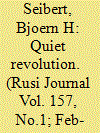

|
|
|
|
|
| Publication |
2012.
|
| Summary/Abstract |
The German armed forces are undergoing an unprecedented reform whose revolutionary nature has so far been poorly understood internationally. Bjoern Seibert explains the context, goals and process that led to the reform, analyses the political debate that surrounded it, and lays out the details of what is the most far-reaching reform effort since the end of the Cold War.
|
|
|
|
|
|
|
|
|
|
|
|
|
|
|
|
| 8 |
ID:
118021


|
|
|
|
|
| Publication |
2013.
|
| Summary/Abstract |
One of the most important legacies of the Occupy Movement is the positive impact it has had on political discourse. In light of what at face value seems to be a thorough routing of formal organizations of Occupy, and a similar erosion of its public appeal, it has nonetheless had a significant impact on political debate, globally. These effects are still evident today, despite the fact that, to the best of my knowledge, the Occupy Movement was not mentioned by either presidential candidate in any major speech or policy announcement during the recent 2012 US election.
|
|
|
|
|
|
|
|
|
|
|
|
|
|
|
|
| 9 |
ID:
164908
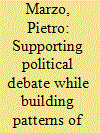

|
|
|
|
|
| Summary/Abstract |
This article focuses on a specific aspect of the international context surrounding the Tunisian transition to democracy. Through the case of the German political foundations in Tunisia, this study argues that the country’s journey to democracy has not been an exclusively domestic affair, but has also been the product of the engagement of international actors and their interplay with domestic groups. Building on evidence from semi-structured interviews and data triangulation the article shows that since the late 1980s four German political foundations operating in Tunisia created platforms for ‘political debate’ – alternative to the regime’s but not subversive – and encouraged political training. The article posits that initially the German political foundations helped Ben Ali’s regime in the making of a ‘façade liberalisation’, while in the long run their activities generated unintended consequences that in part undermined its ‘authoritarianism upgraded’. The article demonstrates that their longstanding presence on the ground allowed the German political foundations to develop patterns of trust with and between political and civil groups, ultimately improving the capacity of their action after the revolution.
|
|
|
|
|
|
|
|
|
|
|
|
|
|
|
|
| 10 |
ID:
123253
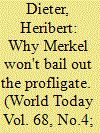

|
|
|
|
|
|
|
|